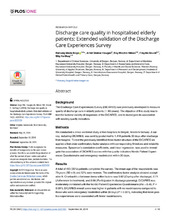| dc.contributor.author | Boge, Ranveig Marie | en_US |
| dc.contributor.author | Haugen, Arvid Steinar | en_US |
| dc.contributor.author | Nilsen, Roy Miodini | en_US |
| dc.contributor.author | Bruvik, Frøydis Kristine | en_US |
| dc.contributor.author | Harthug, Stig | en_US |
| dc.date.accessioned | 2020-04-08T05:52:36Z | |
| dc.date.available | 2020-04-08T05:52:36Z | |
| dc.date.issued | 2019 | |
| dc.Published | Boge RM, Haugen AS, Nilsen RM, Bruvik FK, Harthug S. Discharge care quality in hospitalised elderly patients: Extended validation of the Discharge Care Experiences Survey. PLOS ONE. 2019;14(9):e0223150 | eng |
| dc.identifier.issn | 1932-6203 | |
| dc.identifier.uri | https://hdl.handle.net/1956/21803 | |
| dc.description.abstract | Background: The Discharge Care Experiences Survey (DICARES) was previously developed to measure quality of discharge care in elderly patients (≥ 65 years). The objective of this study was to test the factorial validity of responses of the DICARES, and to investigate its association with existing quality indicators. Methods: We conducted a cross-sectional study at two hospitals in Bergen, Western Norway. A survey, including DICARES, was sent by postal mail to 1,418 patients 30 days after discharge from hospital. To test the previously identified three-factor structure of the DICARES we applied a first order confirmatory factor analysis with corresponding fit indices and reliability measures. Spearman’s correlation coefficients, and linear regression, was used to investigate the association of DICARES scores with the quality indicators Nordic Patient Experiences Questionnaire and emergency readmission within 30 days. Results: A total of 493 (35%) patients completed the survey. The mean age of the respondents was 79 years (SD = 8) and 52% were women. The confirmatory factor analysis showed acceptable fit. Cronbach’s α between items within factors was 0.82 (Coping after discharge), 0.71 (Adherence to treatment), and 0.66 (Participation in discharge planning). DICARES was moderately correlated with the Nordic Patient Experiences Questionnaire (rho = 0.49, P < 0.001). DICARES overall score was higher in patients with no readmissions compared to those who were emergency readmitted within 30 days (P < 0.001), indicating that more positive experiences were associated with fewer readmissions. Conclusions: DICARES appears to be a feasible instrument for measuring quality of discharge care in elderly patients (≥ 65 years). This brief questionnaire seems to be sensitive with regard to readmission, and independent of comorbidity. Further studies of patients’ experiences are warranted to identify elements that impact on discharge care in other patient groups. | en_US |
| dc.language.iso | eng | eng |
| dc.publisher | PLOS | eng |
| dc.rights | Attribution CC BY | eng |
| dc.rights.uri | http://creativecommons.org/licenses/by/4.0 | eng |
| dc.title | Discharge care quality in hospitalised elderly patients: Extended validation of the Discharge Care Experiences Survey | en_US |
| dc.type | Peer reviewed | |
| dc.type | Journal article | |
| dc.date.updated | 2020-02-04T19:58:21Z | |
| dc.description.version | publishedVersion | en_US |
| dc.rights.holder | Copyright 2019 The Author(s) | |
| dc.identifier.doi | https://doi.org/10.1371/journal.pone.0223150 | |
| dc.identifier.cristin | 1743812 | |
| dc.source.journal | PLoS ONE | |

